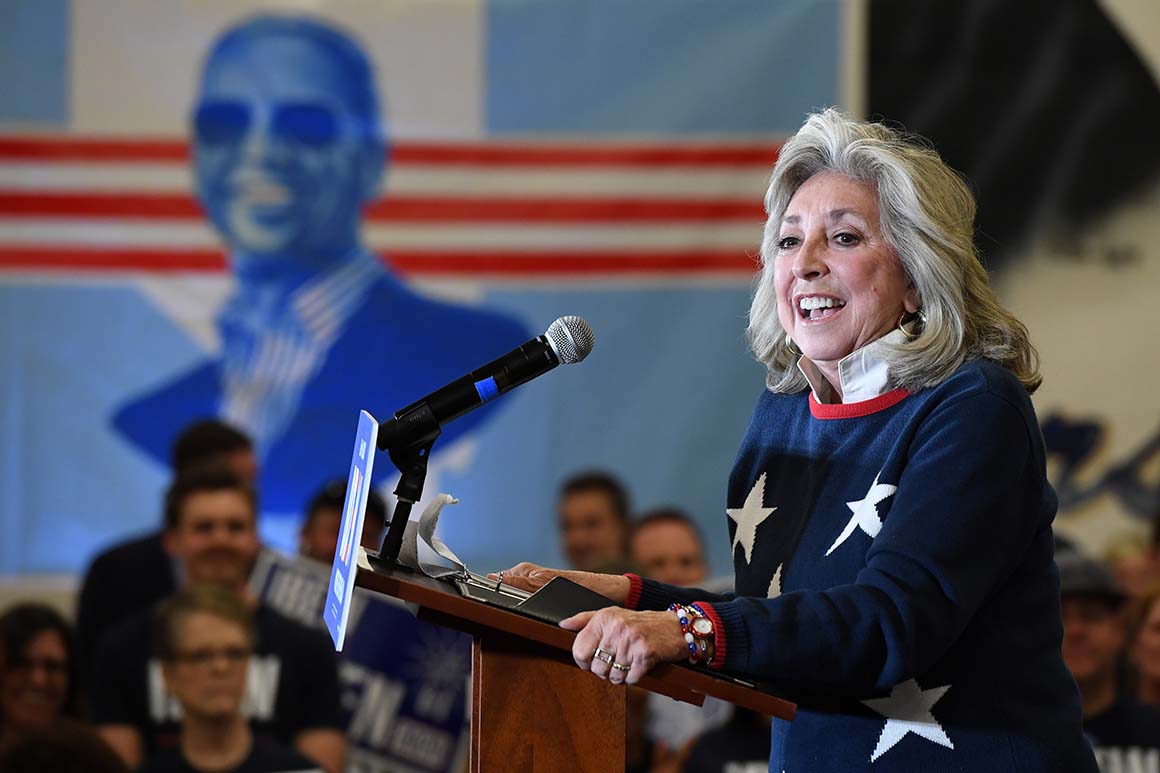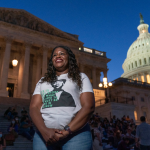After a year full of high-profile losses, progressives are looking toward Las Vegas, where activist Amy Vilela is taking on Democratic Rep. Dina Titus.
A few of the biggest names on the left are wading into the primary, sensing opportunity in a state that handed Sen. Bernie Sanders (I-Vt.) a resounding win in the 2020 presidential caucus and elected a slew of Democratic socialists to its state party leadership earlier this year.
Former Ohio state Sen. Nina Turner is the latest to endorse Vilela — one of her first public moves since she lost a special primary election for a congressional seat to a more establishment-aligned candidate.
“I certainly plan to do everything that I can to help Amy be successful in this race,” Turner said. Her endorsement comes about two months after one from Rep. Cori Bush (D-Mo.), another liberal icon. "Our movement is not losing — I mean, if you look at the influence that we have collectively."
Vilela first got into politics in 2018 when she competed in a primary for a neighboring seat, coming in third behind then-former Rep. Steven Horsford (D-Nev.) — a campaign that was documented by Netflix’s “Knock Down the House” along with Bush and Rep. Alexandria Ocasio-Cortez (D-N.Y.).
Vilela supports top progressive policy proposals, including the Green New Deal and Medicare for All, and centers her campaign on a heart-wrenching personal tragedy that inspired her to enter politics.
Her 22-year-old daughter, Shalynne, died of a blood clot in 2015, and Vilela believes she was turned away from a hospital where she could have received life-saving care because she lacked health insurance. It was Turner, she said, who helped her turn her grief into purpose.
"She is uniquely positioned, given how she’s taken something that is traumatic and out of the natural order of things, having to bury your daughter because of a callous indifference in a commodified health care system," Turner said, calling her a "champion."
"She can leverage her personal story — the work that she’s been doing all these years — with being a congresswoman," she added. "That’s dynamite right there."
The pair met at a Medicare for All conference several years ago where Turner was a featured speaker. Vilela’s husband found himself in an elevator with Turner and told her their story. Turner was so moved she spontaneously included it in her speech.
"All of a sudden she was talking about that she met the father of this young lady who had died from a lack of health care, and she went, ‘And in this great country, no 22-year-old should be dying from a lack of health care,’" Vilela recalled. "It tears me up now to talk about it. It was the first time that someone had said that my daughter didn’t deserve to die."
Turner and Vilela have shared a close bond ever since. Vilela, an accountant, served as treasurer for Turner’s campaign in Ohio this year and worked with her on Sanders’ 2020 presidential bid.
The race for a deep blue Las Vegas-based district has similar fault lines as Turner’s race this summer. Titus was an early backer of now-President Joe Biden’s 2020 bid (and was rumored to be in contention for an ambassadorship). Vilela, meanwhile, was a co-chair of Sanders’ 2020 campaign in Nevada — which the Vermont senator won by a landslide.
Titus, first elected in 2008 in a swing seat, lost in the 2010 wave and moved to her current deep-blue district in 2012. Though she is aligned with Biden, she has progressive bona fides. She is a founding member of the Medicare for All caucus and helped create renewable energy standards in the state.
Vilela’s main argument against Titus is a claim that she’s not shown up enough in the district and hasn’t made gains on key issues like immigration reform and that she does not support a "Green New Deal."
"Our status quo leadership is not getting the job done,” she said. “They’re not present on the ground in the community. And it’s not just me saying that.”
(Titus, for her part, appears to be taking the threat seriously. Her Twitter is packed with pictures of her campaign at a Teamsters event, a Zoom meeting on fighting climate change and at an gathering to kick off Hispanic Heritage Month.)
In a statement, Titus spokesperson Blake Williams called Titus "a life-long progressive champion" and noted she "fought the Trump administration tooth and nail to protect immigrant communities.""To borrow a quote from our opponent: On progressive policies, Congresswoman Titus ‘is what leadership looks like,’” Williams said.
The Nevada race could be a major big test for the left. Turner’s loss in Ohio came after a series of setbacks when the progressive candidates lost a special election in Louisiana in April, the Virginia governor’s primary and the New York mayoral primary in June.
In an interview announcing her endorsement of Vilela, Turner reflected on her special last month in Ohio and what progressives can learn from her mistakes.
In retrospect, she said she regretted spending so many resources early in an attempt to put the race away in May, well before the actual August primary. She was surprised by the intensity of the groups who boosted her chief opponent, Cuyahoga County Councilmember Shontel Brown.
And she said she had not ruled out a rematch against Brown — who is the heavy favorite to join Congress in a special election in November — in the regularly scheduled primary election next year.
"The filing deadline is in February of 2022," Turner said. "And guess what? 435 House seats are up, and it’s going to be a different environment, meaning all the firepower cannot just be concentrated in Ohio’s 11th district. And, also, the lines will be different, as well. So we shall see."
Her request to the left this cycle is that the disparate groups and organizations try to act in unison in only a handful of races to avoid spreading their resources too thin — and she hopes Vilela’s primary in Nevada will be one of those races.
"They have got to bring that firepower together in a more organized strategic plan, test kind of way. So that they can help to really push and catapult that progressive candidate — you can’t do it in every single race, so a decision is going to have to collectively be made."





















